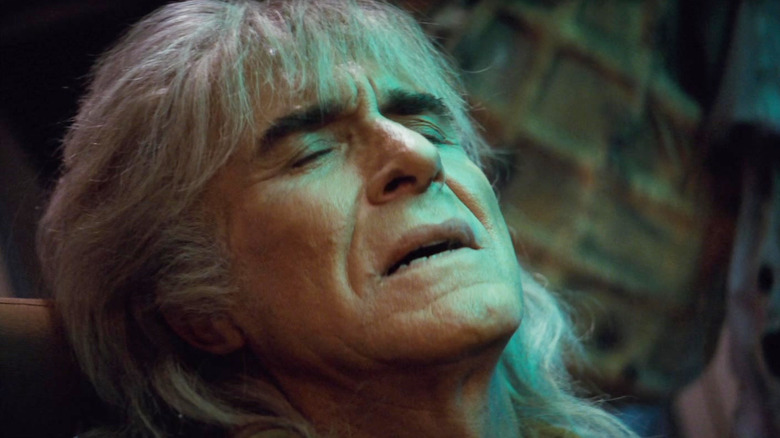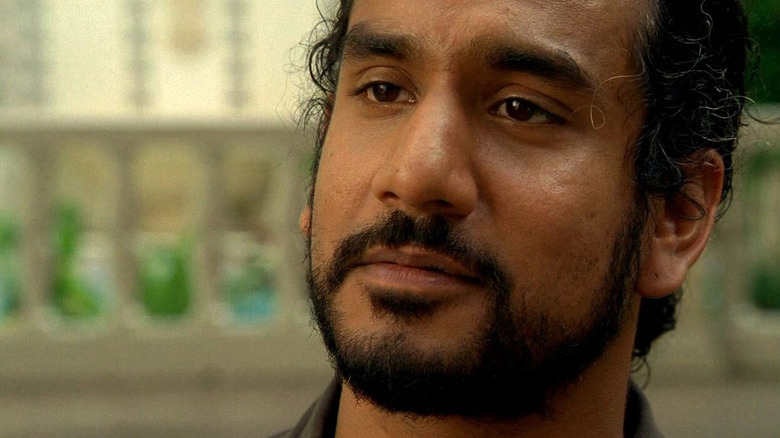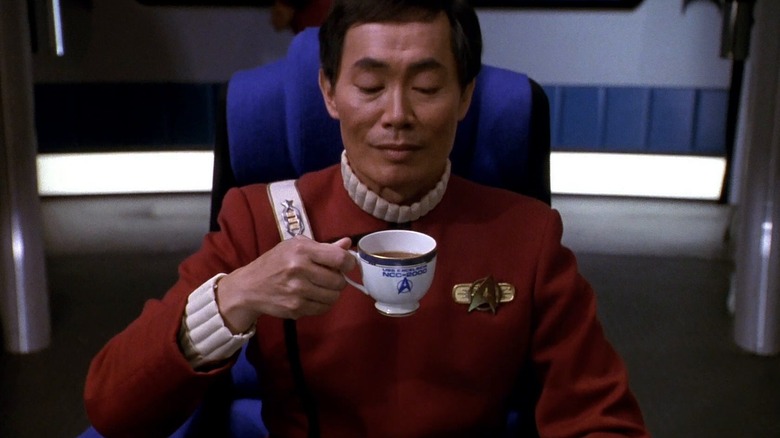Star Trek's Best Movie Ever Has An Unconventional Prequel Series Fans Will Love
The common consensus among Trekkies is that Nicholas Meyer's 1982 film "Star Trek II: The Wrath of Khan" is the best of the 14 "Star Trek" movies to date. The point can be debated, of course, but "The Wrath of Khan" is pretty unassailable. It has a solid script and explores themes of Admiral Kirk (William Shatner) finally having to reckon with his ordinarily-well-regarded recklessness. He is rounding middle age, his eyes are failing him, and several shadows have re-arisen from his past.
Terrifyingly, Kirk finds himself in the crosshairs of Khan (Ricardo Montalbán), a character he had previously met in the 1967 "Star Trek" episode "Space Seed." There, Khan tried to take over the Enterprise, but he was foiled. Khan, for those not aware, was a cryogenically frozen, genetically enhanced super-soldier left over from a series of devastating wars that ravaged the Earth back in the 21st century. He was a charismatic, violent warlord for many years before freezing himself and launching himself into space. After being unfrozen, he had every intention of restarting his career as a dictator.
Kirk put the kibosh on Khan's plans (natch) and, rather than imprisoning him, offered him a unique sociological challenge. Could Khan and a cadre of fellow super-soldiers actually construct a masterpiece society, given time and complete noninterference? Kirk then drops off Khan and some of his super-soldiers on a verdant, Edenic planet — Ceti Alpha V — and flies off. "The Wrath of Khan" picks up decades later after a natural cataclysm has reduced Khan's world to an uninhabitable desert. He is rightly miffed that Kirk never checked in on him, and he now seeks revenge.
Khan's backstory on 21st century Earth has been explored in non-canonical expanded universe media like novels and video games, but a recent addition to "Star Trek" media has now provided Trekkies with more. The brand-new audio drama "Star Trek: Khan" is a nine-episode series that will follow Khan from the time he was dropped off on Ceti Alpha V to when he was discovered in "The Wrath of Khan."
Star Trek: Khan fills in one of Star Trek's chronological gaps
"Star Trek: Khan" is available wherever one finds their favorite podcasts. The fully-produced audio drama was written by longtime "Star Trek" novelists Kristen Beyer and David Mack, ensuring that "Khan" will be ambitious and engaging in the way "Star Trek" tie-in novels typically are. It was directed by Fred Greenhalgh. Meanwhile, Naveen Andrews plays Khan, making him the first adult actor of Indian heritage to play the Indian character. Elsewhere, Wrenn Schmidt plays Marla McGivers, a Starfleet officer who became enamored with Khan in the "Space Seed" episode and was originally played by Madlyn Rhue.
"Star Trek: Khan" will cover the full missing 20 years of Khan's adventures on Ceti Alpha V and the slow dissolution of the planet. The story will be told in flashback from the bridge of the U.S.S. Excelsior. As Trekkies could inform you, the Excelsior was the spaceship that Hikaru Sulu (George Takei) became the captain of in "Star Trek VI: The Undiscovered Country" Thanks to an episode of "Star Trek: Voyager," we also know that the Vulcan Tuvok (Tim Russ) served on the Excelsior at the same time. Naturally, Takei and Russ are reprising their roles for the audio drama, with Olli Haaskivi, Maury Sterling, Mercy Malick, Zuri Washington, and Sonya Cassidy also rounding out the cast. Andrews, in particular, is good casting for Khan, and /Film has already noted that the actor should play Khan in live-action as well.
In "The Wrath of Khan," Khan gives a brief speech about how his planet was devastated by a solar flare that changed the biome of Ceti Alpha V into a dying desert. He and his cadre of super-soldiers were thus forced to move into his old crashed ship and remain there for years, subsisting on lord-knows-what. "Star Trek: Khan," however, will cover the more intriguing part of that story: What Khan and his cadre were doing on Ceti Alpha V before the cataclysm. Indeed, what did Khan's so-called masterpiece society look like? Was it on the way to being successful? I'd be eager to know.
Star Trek: Khan isn't the first audio drama of its kind
The "Star Trek" franchise has seen the release of several audio dramas like "Star Trek: Khan" in the past. Starting in 1975, Peter Pan Records assembled a new cast of actors to read out audio-only "Star Trek" stories for release on vinyl. Ultimately, 23 such vinyl albums were released from 1975 to 1979, sometimes re-releasing earlier stories that were re-shuffled to be paired with others. Those records are hard to find now and remain one of the more obscure pieces of "Star Trek" media.
Over the years, there have also been read-along records that accompanied children's adaptations of the "Star Trek" feature films. Those aren't quite the same as audio dramas, of course, as they merely remix dialogue from the movies, which is then interspersed with narration.
In the 1990s, when the popularity of the "Star Trek" franchise was at a notable high, Simon & Schuster also put out several interesting audio projects. For instance, actors Leonard Nimoy and John de Lancie gathered on a stage to have a debate in character as Spock and Q, respectively. The shows were called simply "Spock vs. Q" and "Spock vs. Q: The Sequel." One might also recall George Takei playing Captain Sulu in a trio of original audio stories called "Transformations," "Cacophony," and "Envoy." In 2022, a full-blown audio drama titled "No Man's Land" was similarly released. Written by Kirsten Beyer and Mike Johnson, it followed the characters Seven of Nine (Jeri Ryan) and Raffi (Michelle Hurd) after the events of the first season of "Star Trek: Picard." In that time, the two had a full-blown romance that ended badly (something that is referenced in the second season of "Picard").
"Star Trek: Khan" is the latest in a small but vital part of the "Star Trek" property. It's definitely worth a listen.


